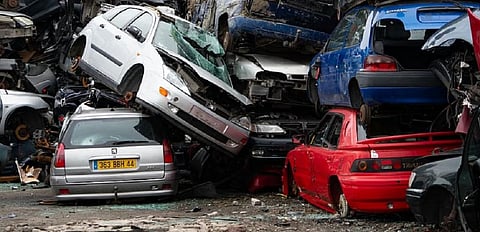

Safe disposal and material recovery should be the critical parameters of an effective vehicle scrapping policy for India, even as the country awaits one, Delhi-based non-profit Centre for Science and Environment (CSE) has suggested.
CSE recently released a report What to do with old vehicles: Towards effective scrappage policy and infrastructure, as India awaits the notification of such a policy prepared by the Union Ministry of Road Transport and Highways for Cabinet approval.
India will have a monumental load of over two crore old vehicles nearing the end of their lives by 2025. These, along with other unfit vehicles, will cause huge pollution and environmental damage.
India needs a well-designed scrappage policy to lower emissions, reduce environmental damages and recover material from clunker as part of a post-COVID-19 new green deal, according to CSE experts.
“There is an enormous opportunity to turn this policy into an instrument for green recovery. Bharat Stage VI emissions standards and electric vehicle incentives are in place and polluted cities have included old vehicle phase-out as part of their clean air action under the National Clean Air Programme,” Anumita Roychowdhury, CSE executive director-research and advocacy, who spearheaded the research that has gone into the new report, said.
“The new policy must leverage these opportunities to maximise emissions gains from replacement of end-of-life vehicles and recover material from the wasted clunkers for reuse and recycling,” she added.
The new scrappage policy needs to link economic recovery and fiscal stimulus with replacement of older heavy-duty vehicles with BSVI vehicles, according to the report. The scrappage scheme should incentivise replacement with electric vehicles for personal cars and two-wheelers.
The advent of the BSVI emissions standards and the electric vehicle programme were an opportunity to renew the fleet with significantly cleaner vehicles. BSVI heavy duty vehicle are designed to emit 35 times less particulates compared to BS-I vehicles.
India’s end-of-life regulations for manufacturers ask for making vehicles in such a manner that a minimum 80-85 per cent is recyclable / recoverable / reusable from end-of-life vehicles.
Also, vehicles should not contain toxic metals like lead, mercury, cadmium or hexavalent chromium other than specified conditions, according to these rules.
This should be strengthened further to include extended producer responsibility and making the rules legally binding, the report said.
Environmentally sound vehicle scrappage infrastructure should be scaled up country-wide for safe disposal of waste and for material recovery for recycling like steel, aluminum and plastics, it added.